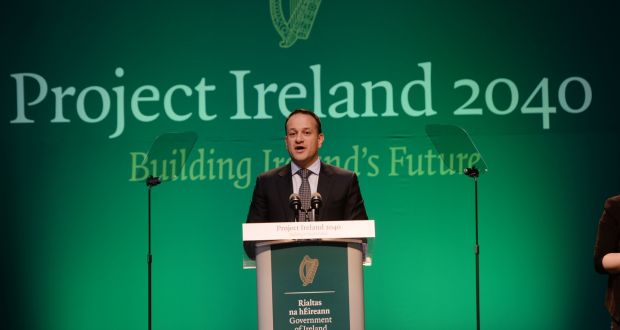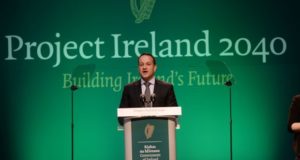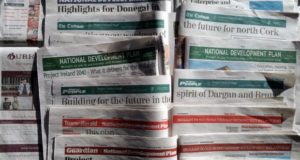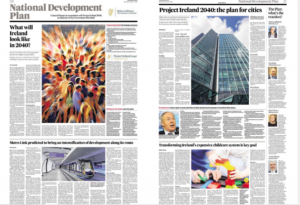
Have I got news for you?

That’s how these events go now. It’s not enough to turn up, accept your award and thank your parents. You must ascend the pulpit, take a deep breath, and rage against the machine. Because, in today’s upside-down world, celebrities are king. Their words hold sway, their actions speak loudest, and when unified as one, they are almost unstoppable.
Amidst all this tomfoolery there’ll be some Irish interest; Saoirse Ronan probably won’t win Best Actress, but Martin McDonagh has a shot at Best Picture with the hotly-tipped, Three Billboards Outside Ebbing, Missouri. To win it he will have to overcome, among others, The Post, a film which ticks all the necessary Oscar boxes. Directed by Steven Spielberg, and starring both Meryl Streep and Tom Hanks, it tells the story of the Washington Post’s attempts to publish the Pentagon Papers, a damning set of documents that detailed the US government’s involvement in the Vietnam War.
Eventually, after struggling with legal and moral quandaries, the Washington Post did publish those papers, exposing the misdeeds of four American presidents and hastening the exit of incumbent commander-in-chief, Richard Nixon, in the process. It was a victory for the free press, a reminder that the fourth estate would not, and could not, be silenced. Those were glory days for journalism, a time when reporters could summarise the political climate as they saw fit, holding elected officials to account on behalf of a disillusioned public.
Some fifty years later and the climate is very different. The US media no longer acts as a watchdog, its motives as befuddled as the political landscape it surveys. But it’s not like we’re any better. At least in the States they have the decency to nail their colours to the mast. We pussyfoot around the issue of bias and objectivity, pretending that we’re impartial when we’re anything but. As bad as things are in America I can’t imagine The New York Times or The Boston Globe running two-page advertorials championing the policies of President Trump and his cronies.

Several regional papers have run the ads too, with some alleging that they were asked to print them as de facto stories rather than the fluffed-up spin they are.
An Taoiseach has been quick to defend the articles, stating that it was,” right that the government would want to explain to the public what we’re doing and how money is being spent on their behalf”. Those sentiments were backed up by a spokesperson for Independent News and Media, who said that their, “publications frequently enter into partnerships with a variety of organisations and events as do other major media organisations. In no way do these arrangements cross over with the news coverage of the subjects at hand. The content referred to is clearly marked at the top of the pages and online as being ‘in partnership’ to delineate it from our regular coverage.”
So there you go, it’s all above board, nothing to see here. The fact that our Government is in cahoots with both national and regional press is, according to our leader, perfectly normal. Not only that, those on the receiving end, the newspapers in question, are okay with this situation too; they’re happy to publish this propaganda, to spread the word according to Leo. Both parties have alluded to the presence of the banners, the insignia which informed readers they were ingesting sponsored content, as if that somehow makes it okay. That so long as there’s a harp on the top of the page they can write what they want.

He seems genuinely surprised that someone might take offence to this marketing strategy, that the promotion of his interests in the mainstream media could be deemed a conflict of interest by those who still believe in the freedom of the press. By pointing to the terms of agreement, the partnership with the papers, he truly believes that he is vindicating this policy and absolving himself of any blame. And he is, at least from a legal stance.
But ethically, morally, this initiative represents all that is wrong with Irish politics, and indeed the Irish media.
We all know the newspaper industry is dying on its arse, that sales are dropping, and resources are dwindling. The result is a risk-averse approach, a percentages game where the bottom line is more important than good quality content. Essentially the news editors of Ireland are in thrall to anyone with a buck, their own personal values and beliefs secondary to the survival of the paper.
And our Government knows this, it knows the value of its adverts. More importantly, it knows the value of its ‘partnership’, knows that reporters rely upon its quotes, inside secrets, and leaked information, and knows that threatening to sever those ties is one way of ensuring quiet, docile, cooperation.
And nowhere is this more keenly felt than in the offices of your local, regional paper. While the big boys up in Dublin can boast sales of almost six figures, the small provincial titles must scrap and fight for each individual sale. Therefore, it’s no surprise that they were asked to run these adverts as if real news, to swallow the lies whole and expect their readers to do the same. That they chose not to do, chose to stand up for what they believe in, is a small victory, but a victory nonetheless. But theirs is a losing battle. Because while the 2040 content may have come under a governmental banner, much of the rest doesn’t.
You’ll see it in these very pages, political doublespeak masquerading as news, carefully crafted statements from deputies and senators, councillors and officials, written especially for this paper, so that you may cast your eyes upon it and think favourably of those who spoke it.
In times past, these ‘stories’ wouldn’t have warranted an inch of column space, but now, with journalists under pressure to file copy, and with no time to carry out proper investigative work, they accept these missives, regurgitate them verbatim, and move on to the next one.
Where once the media held politicians to ransom, kept them honest, it is now, to an extent, just another member of their PR team, a glorified writer of press releases.
This is the reality we live in now, a reality where whatever power the media once had is slowly evaporating. Where elected officials can ride roughshod over local journalists, safe in the knowledge that there will be no comeback, that the journalist needs them far too much to do anything foolish. They answer to no-one now, least of all the servile lackey with the Dictaphone.
And you, the public, you only hear what they want you to hear, curated content, presented by their buddies at the paper.
When the wind blows, the cradle will rock

There are some days when, having come in at 10am, I still find myself on campus at 3pm, out on my feet, my overworked brain completely frazzled.
I tell you what would help, what would ease the strain: a little nap, forty winks, a chance to recharge the batteries before going to the lecture hall to listen to a person speak.
Unfortunately, I’m in the wrong college.
To avail of such luxuries, one must attend Maynooth University (NUIM). It has installed three napping pods on its campus; high-tech, soundproof cocoons which allow students to take twenty-minute breaks in the middle of their day.
In an effort to make sleepy-snoozy-time that little more pleasurable, members of staff at NUIM provide free Superman jim-jams for the lads, Wonder Woman ones for the girls, and pink fluffy slippers for all. And when they wake from their slumber, and stretch their weary bones, students are given large mugs of cocoa with delicious sugary marshmallows on top, before heading to the canteen to have their boiled egg with soldiers.
Catering staff have, thus far, refused to make aeroplane noises as they spoon-feed the hungry mites.










